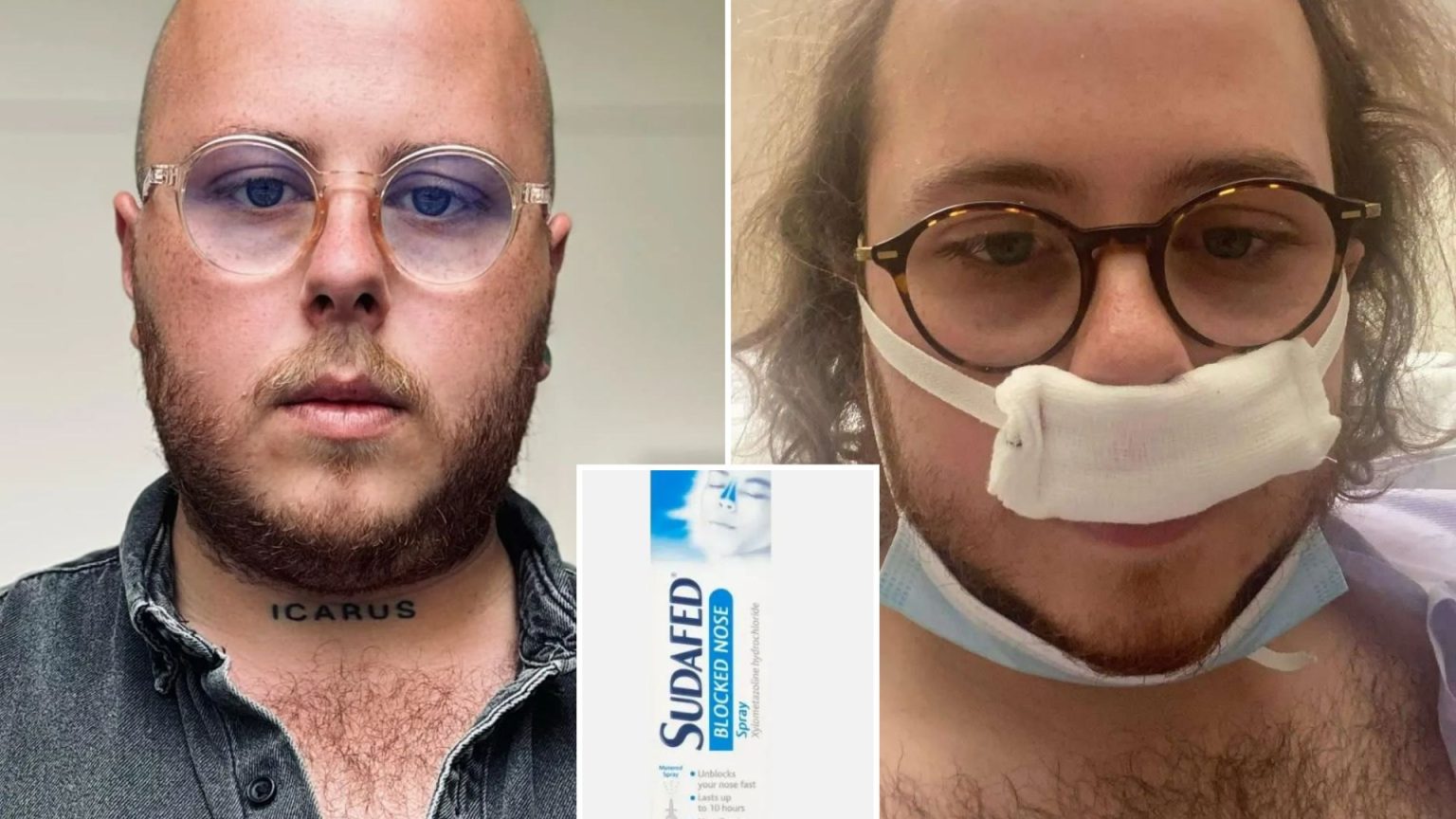Curtis Arnold-Harmer, a 29-year-old creative practitioner, found himself facing a severe nasal issue that baffled doctors. Upon examining the damage within his nostrils, medical professionals suspected long-term cocaine abuse, assuming he had been using the drug since his teenage years. However, Curtis vehemently denied ever using cocaine. The true culprit behind his deteriorating nasal septum was his prolonged and excessive use of over-the-counter decongestant nasal sprays, specifically Sudafed. What began as a simple solution for a stuffy nose spiraled into a costly and debilitating addiction. Curtis’s story highlighted a growing, yet often overlooked, problem of dependence on readily available nasal decongestants.
Curtis’s dependence on Sudafed developed rapidly. Within just two months of first using the spray, he found himself reliant on it, needing a dose every two hours. He described his experience not as a pleasurable high, but rather a desperate need to breathe. He experienced constant anxiety and fear, driven by the sensation of suffocating without the spray. His sleep suffered, punctuated by episodes of waking up gasping for air. Simple activities like his daily walks became a struggle, as he could only breathe through his mouth. The financial burden of his addiction also mounted, costing him over £100 a month and accumulating to over £2,400 during the two-year period. The Sudafed addiction permeated every aspect of his life, becoming a source of humor amongst friends who would gift him bottles, a grim irony that Curtis himself recognized as his dependence worsened.
After sharing his story on TikTok, Curtis discovered he was far from alone. Hundreds of other users revealed their own struggles with nasal spray addiction, using hashtags like #nasalsprayaddict and #nosesprayaddict. Their stories ranged from burned septums requiring surgical intervention to deviated septums and permanent nasal damage. This highlighted the widespread, yet largely unacknowledged, problem of rhinitis medicamentosa, or rebound congestion, a documented side effect of prolonged decongestant use. The active ingredients in these sprays, such as xylometazoline, oxymetazoline, and pseudoephedrine, cause the blood vessels in the nose to become reliant on the drug. Upon cessation, these blood vessels swell, exacerbating the original congestion and perpetuating the cycle of dependence.
Curtis’s attempts to quit Sudafed proved futile. Following a GP’s advice to stop cold turkey, he found his dependence worsening with each attempt. Prescribed steroid sprays offered no relief. Finally, after months of waiting due to pandemic-related delays, he saw an ear, nose, and throat specialist. The specialist, upon examining Curtis’s nose, remarked that the damage resembled that of someone who had been snorting cocaine for years. Immediate surgery was deemed necessary to repair Curtis’s damaged nasal passage, with the doctor warning that further delay could lead to his septum rotting away. This stark reality mirrored the highly publicized case of actress Daniella Westbrook, whose septum deteriorated due to cocaine abuse.
Curtis faced another agonizing seven-month wait for surgery due to ongoing pandemic-related delays. During this period, he continued using Sudafed, feeling it was his only recourse for breathing. The eventual surgery, a turbinate reduction, aimed to shrink or remove nasal tissue to improve airflow. While successful, the recovery was arduous, involving weeks of nasal discharge, inability to breathe through his nose, and the possibility of future surgeries. Though his breathing eventually returned to normal, the experience left a lasting impact on Curtis. He developed a deep aversion to medication, taking only essential painkillers when absolutely necessary. The ordeal had instilled a fear of medication that he expected to stay with him for life.
Motivated by his ordeal, Curtis shared his story on TikTok, receiving an overwhelming response that underscored the prevalence of nasal spray addiction. Hundreds of messages poured in, detailing similar experiences and pleas for help. He had initially believed his situation was unique, but the online community revealed a hidden epidemic. This prompted a wider discussion about the dangers of prolonged decongestant use and the need for clearer warnings on product packaging. Experts recommend limiting use to three to seven days and seeking advice from a pharmacist for alternative remedies like saline solutions or natural options. Curtis, now firmly against Sudafed, advocates for nasal irrigation with saline solution as a safer alternative for nasal congestion. His story serves as a stark warning about the potential consequences of overlooking product guidelines and the crucial role of awareness and education in combating this silent addiction.


